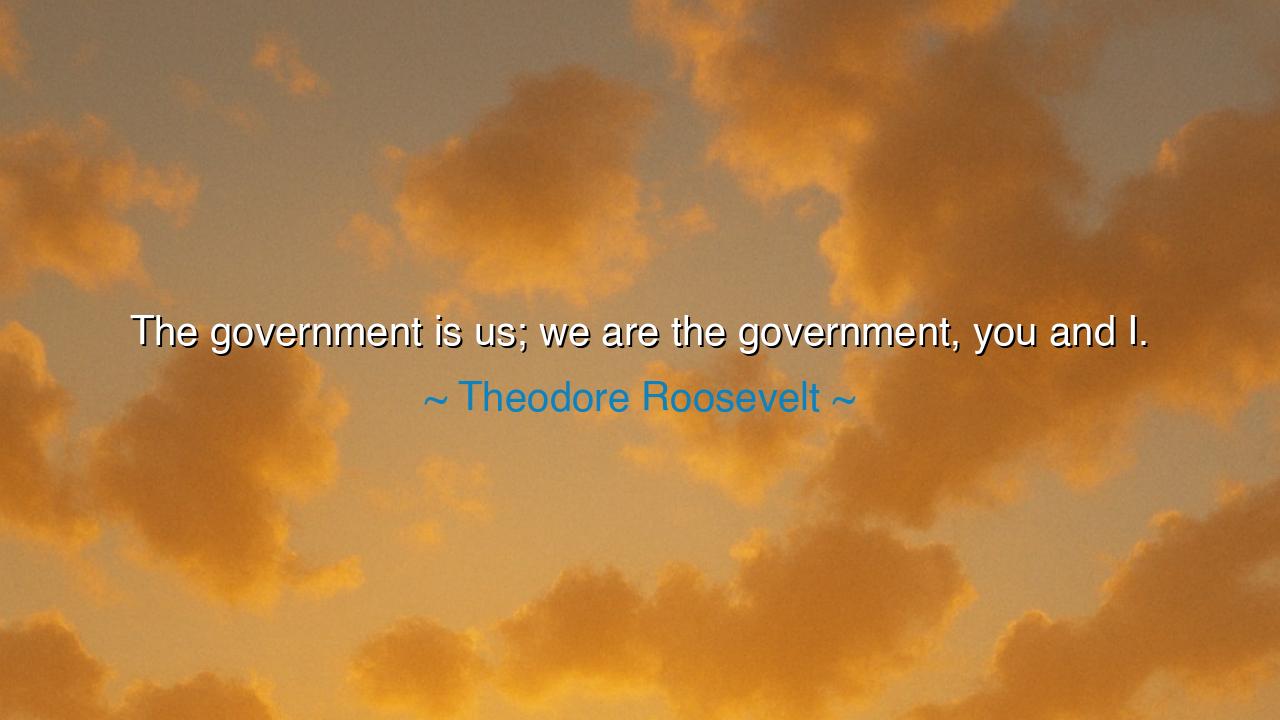
The government is us; we are the government, you and I.






When Theodore Roosevelt declared, “The government is us; we are the government, you and I,” he spoke not merely as a statesman but as a moral guardian of democracy’s soul. These words are not a political slogan; they are a call to remembrance — a reminder that government is not a distant power, not a faceless machine, not a tyrant to be feared, but the collective embodiment of a free people’s will. Roosevelt’s voice, steeped in conviction and civic faith, reaches through time to awaken citizens who have grown detached from the power and duty that freedom demands. In his heart, he knew that liberty endures only when the people see themselves not as subjects of government, but as its living foundation.
The origin of this quote reflects Roosevelt’s lifelong devotion to public service and the idea of the “citizen-republic.” During the early 20th century, America was facing the growing pains of industrialization, corruption, and social division. Many citizens, weary of political machines and monopolies, began to lose faith in their institutions. Roosevelt, with his characteristic vigor and sense of righteousness, sought to restore that faith. He understood that democracy falters not when its leaders fail, but when its people forget their role. Thus he spoke, reminding Americans that a republic cannot survive when the governed believe government to be “them” instead of “us.” To Roosevelt, every citizen bore both the privilege and burden of stewardship over the nation’s soul.
His words capture a truth that transcends centuries: power and responsibility are inseparable. The government, in its purest form, is not an external entity; it is the mirror of a nation’s character. If it becomes corrupt, it reflects the people’s complacency; if it becomes just, it reveals their virtue. Roosevelt believed that civic life — voting, service, advocacy, and sacrifice — was sacred work. He rejected cynicism as the coward’s creed, calling instead for active citizenship. “The government is us,” he thundered, because he saw clearly that the health of democracy depends not on the brilliance of a few, but on the conscience of all.
One need only look to ancient Athens to see the timelessness of this lesson. There, in the cradle of democracy, the idea of self-governance was both a privilege and a duty. Every citizen was expected to engage in debate, to vote, to serve in the army, and to defend the city’s laws. When that spirit waned — when Athenians grew content to let others govern on their behalf — their democracy withered, and tyranny crept in. Roosevelt, steeped in classical learning, saw the same danger in modern times. He understood that freedom dies not from conquest, but from neglect. When citizens cease to care, the state begins to rot from within.
In Roosevelt’s own era, his crusade against corporate monopolies and political corruption embodied this belief. He stood as the people’s champion — not to replace them, but to awaken them. His battles against the great trusts were fought in the name of restoring power to ordinary men and women, so they might reclaim their voice in a system that had begun to favor the mighty over the many. He did not seek to destroy wealth or enterprise, but to remind the nation that the people are the ultimate sovereigns — that the government draws its strength not from privilege, but from participation. In his hands, the presidency became not a throne, but a platform for moral leadership.
And yet, Roosevelt’s warning still echoes today. Too many view government as something alien — a remote power to blame or fear, rather than a sacred trust to shape and uphold. This division between citizen and state is the slow poison of democracy. The moment we say “they” instead of “we,” the republic begins to crumble. The institutions that falter do so because the hearts behind them have grown indifferent. Roosevelt’s vision of America — energetic, just, and united — can survive only through citizens who act with integrity, courage, and compassion. Freedom, he knew, is not self-sustaining; it must be fed daily by the labor of the free.
The lesson is clear and timeless: we are not ruled; we are responsible. To criticize is easy; to participate is divine. Each person, no matter how humble, carries a spark of sovereignty. To vote is to speak for one’s nation; to serve is to sustain it; to uphold justice in small things is to strengthen the whole. Roosevelt’s words should live in the heart of every citizen — as a prayer and a vow: If government fails, it is because we have failed to govern ourselves. If it succeeds, it is because we have remembered who we are.
So let this teaching be carried onward: the government is not apart from you — it is the sum of you. Guard it with the vigilance of a parent, the pride of a craftsman, and the devotion of a patriot. For when citizens rise to claim their rightful role, no tyranny can prevail, no corruption can endure. As Roosevelt himself lived and believed, the strength of a nation is not in its armies nor its wealth, but in the spirit of a people who remember that they themselves are the state — “you and I,” the eternal guardians of freedom.






AAdministratorAdministrator
Welcome, honored guests. Please leave a comment, we will respond soon